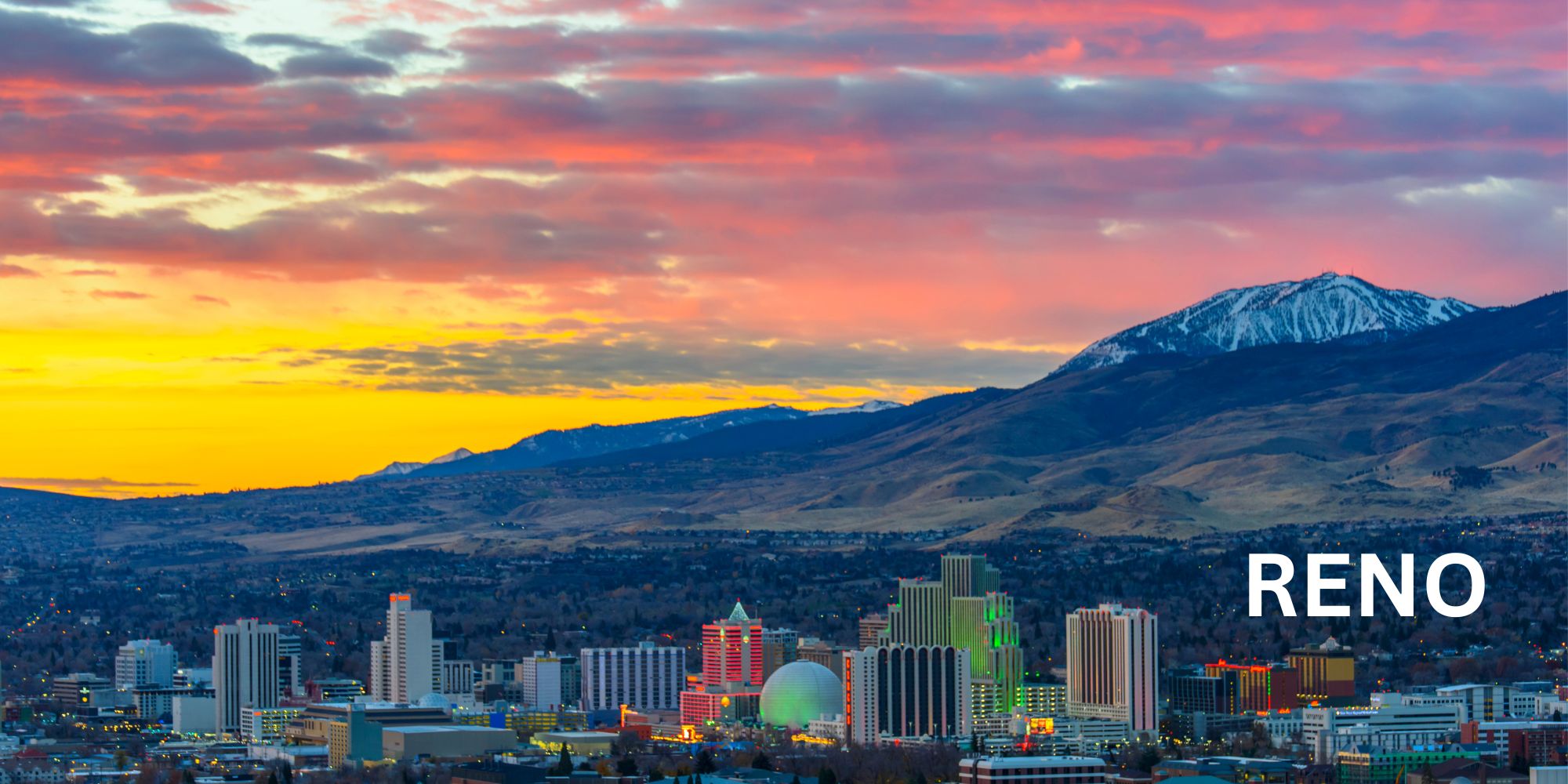
Altitude sickness is a common concern for those traveling to the high-altitude destination of Reno, Nevada. As a high-altitude based company, in this comprehensive guide we'll delve into Reno altitude and our best six tips to avoid Reno altitude sickness.
Reno altitude sits at 4,505 feet above sea level. East of the Sierra Nevada, Reno is one of the highest cities in the state.
The breathtaking landscapes and thrilling outdoor activities in the high elevations of Reno attract visitors year-round. This includes those flying into the Reno-Tahoe International Airport with a similar altitude of 4,415 feet.
Reno is also a stones throw away from other high altitude destinations including the famous Lake Tahoe at 6,225 feet high.
Yes, Reno is considered high altitude.
The definition of high altitude listed by Cornell is anything over 4,000 feet.³ At 4,505 feet, Reno exceeds this threshold.
Yes, you get altitude sickness in Reno Nevada.
According to Julian Klapowitz MD at Travel Medicine Consultants, altitude sickness can begin to occur in elevations as low as 4,000 feet.⁴ While Reno is on the lower scale for high-altitude cities, this puts it on the map for risk of altitude sickness, especially for visitors coming from sea level.
Taking proper precautions for altitude sickness is a must as most people can be set back by Reno's high elevation.
Reno is 4,505 feet or 1,373 meters above sea level.
Rena altitude sickness (acute mountain sickness AMS) happens from the reduced oxygen levels in the thinner air.
It's estimate Reno has 15% less oxygen levels than at sea level.⁵ Combine this with increased physiological challenges including oxidative stress and dehydration, symptoms of altitude sickness can develop including headaches, trouble breathing, and fatigue.
Symptoms of Reno altitude sickness may include:
These signs of altitude sickness in Reno can start to develop within 6-24 hours upon arrival. Be on the lookout and take precautions by following our tips below.
Reno offers an unforgettable experience, but the high elevation can lead to discomfort if not managed properly.
As a high-altitude company out of Colorado, we'll share our top tips to avoid Reno altitude sickness based on experience.
Here's 6 Tips To Help Avoid Reno Altitude Sickness:
By following these six tips, you can help avoid Reno altitude sickness to better enjoy your visit — including hydrating properly, slowly acclimating, getting plenty of sleep, avoiding strenuous activity, limiting alcohol consumption, and supplementing antioxidants.

Zaca is designed to help elevate your journeys. These chewables are your essential travel companion, meticulously crafted with a blend of nutrients and antioxidants including glutathione. Helping you to rehydrate, replenish, and recover faster. With convenient and portable packets, you can take these chewables when you need them most — whether hiking, flying, or exploring. Take 2-4 chewables per day, or as needed. Try Zaca's chewable supplement today and power your adventures.
SOURCES:
1. Reno Nevada Elevation
https://en.wikipedia.org/wiki/Reno,_Nevada
2. Effects of high altitude on humans
https://en.wikipedia.org/wiki/Effects_of_high_altitude_on_humans
3. Cornell High Altitude Definition
https://www.law.cornell.edu/definitions/index.php?width=840&height=800&iframe=true&def_id=2cf9863f85f2f25b6e5e0a2e9dacfe7b&term_occur=5&term_src=Title:40:Chapter:I:Subchapter:C:Part:86:Subpart:S:86.1810-09
4. High Altitude Illness
https://www.travelsurenyc.com/high-altitude-illness/
5. Oxygen Levels at Altitude
https://wildsafe.org/resources/ask-the-experts/altitude-safety-101/oxygen-levels/
6. Reno–Tahoe International Airport Elevation
https://en.wikipedia.org/wiki/Reno%E2%80%93Tahoe_International_Airport
7. Why Do You Need to Drink a Lot of Water at a High Altitude?
https://www.livestrong.com/article/360485-how-to-train-for-high-altitude-hiking
8. Sleep: The Secret Ingredient of Injury Recovery
https://www.orthocarolina.com/media/sleep-the-secret-ingredient-of-injury-recovery
9. Effects of Alcohol
https://www.ahajournals.org/doi/full/10.1161/01.HYP.29.6.1278#
10. High altitude and oxidative stress
https://pubmed.ncbi.nlm.nih.gov/17482529/
11. Effect of high altitude (7,620 m) exposure on glutathione
https://pubmed.ncbi.nlm.nih.gov/11320641/
12. Oxidative Stress and Diseases Associated with High-Altitude Exposure
https://www.ncbi.nlm.nih.gov/pmc/articles/PMC8868315/
13. Reno Forum Altitude and Breathing Problems - Reno's altitude
https://www.tripadvisor.com/ShowTopic-g45992-i246-k4325071-Altitude_and_breathing_problems-Reno_Nevada.html